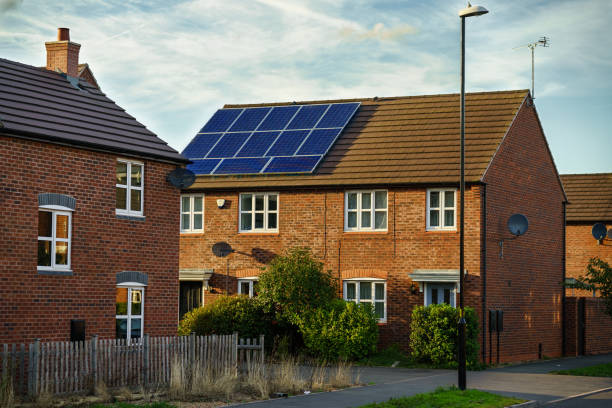
The shift towards renewable energy is more prominent than ever as the world grapples with the challenges of climate change and depleting fossil fuel reserves. In the UK, solar panels have emerged as a popular and effective solution for both reducing carbon footprints and ensuring a sustainable energy future.
Understanding Solar Panels
Solar panels, also known as photovoltaic (PV) panels, are devices that convert sunlight directly into electricity. They are composed of multiple solar cells made from semiconductor materials, typically silicon.
When sunlight hits these cells, it excites electrons, creating an electric current. Solar panels are commonly used in residential, commercial, and industrial applications to provide a sustainable energy source.
How Do Solar Panels Work?
The operation of solar panels is based on the photovoltaic effect. Here is a step-by-step explanation of the process:
-
Photon Absorption: When sunlight (photons) strikes the solar cells, it gets absorbed by the semiconductor material.
- Electron Excitation: The energy from the absorbed light excites electrons in the semiconductor material, causing them to move. This movement generates an electric current.
- Electric Field Creation: Solar cells are constructed with a positive layer and a negative layer to create an electric field. This field forces the freed electrons to flow in a specific direction, forming a current.
- Electricity Generation: The flowing electrons are captured by conductive metal plates on the sides of the cell. These plates transfer the electrons through wires, generating a direct current (DC) of electricity.
- Inverter Conversion: The generated DC electricity is then converted into alternating current (AC) by an inverter. AC is the standard electrical current used in homes and businesses.
-
Power Distribution: The converted AC electricity is distributed to the electrical grid or used directly to power appliances and systems.
Types of Solar Panels
There are three main types of solar panels commonly used in residential applications:
-
Monocrystalline Solar Panels
Monocrystalline panels are made from single-crystal silicon and are known for their high efficiency and longevity. They have a distinctive black appearance and are ideal for installations where space is limited.
-
Polycrystalline Solar Panels
Polycrystalline panels are made from multiple silicon crystals and are generally less efficient than monocrystalline panels. They have a blue hue and are often more affordable, making them a popular choice for larger installations.
-
Thin-Film Solar Panels
Thin-film panels are created by depositing one or more layers of photovoltaic material onto a substrate. They are flexible, lightweight, and can be produced in various sizes and shapes. Although less efficient, they are suitable for unconventional applications and certain types of roofs.
The Benefits of Using Solar Panels and Renewable Energy in Homes
The integration of solar panels and other renewable energy sources into residential properties offers a multitude of benefits. These advantages span economic, environmental, and social aspects, providing homeowners with a comprehensive solution to energy needs.
1. Cost Savings
- Initial Investment and Long-term Returns: While the initial cost of installing solar panels can be significant, the long-term financial benefits are substantial. Over time, the savings on electricity bills can offset the upfront expenditure. Many homeowners experience a return on investment (ROI) within a few years, after which they enjoy virtually free energy for the lifespan of the solar system, typically 25 to 30 years.
- Reduced Electricity Bills: Solar panels generate electricity that can significantly reduce or even eliminate your monthly electricity bills. By producing your own power, you become less dependent on the grid and less susceptible to fluctuating energy prices.
- Government Incentives: Many governments offer incentives to encourage the adoption of solar energy. These incentives can include tax credits, rebates, and grants, which can considerably lower the initial costs of installation.
2. Environmental Benefits
- Reduction in Carbon Footprint: Solar panels generate clean, renewable energy from the sun, reducing the reliance on fossil fuels. This helps to decrease greenhouse gas emissions and mitigate climate change. An average residential solar panel system can offset several tonnes of carbon dioxide per year.
- Sustainable Energy Source: Unlike fossil fuels, solar energy is abundant and sustainable. The sun provides a constant and virtually inexhaustible source of energy, making solar power a key component in the transition to a more sustainable energy future.
- Reduced Air Pollution: By reducing the need for electricity produced by coal, gas, or oil, solar panels help to reduce air pollutants that can harm human health and the environment. This includes pollutants like sulphur dioxide, nitrogen oxides, and particulate matter.
3. Energy Independence
- Self-sufficiency: By generating your own electricity, you reduce your dependence on external energy suppliers and are less affected by energy price volatility and supply disruptions. This self-sufficiency can be particularly advantageous in areas prone to power outages.
- Energy Security: Renewable energy sources such as solar panels contribute to national energy security by reducing the overall demand for imported fossil fuels. This can help to stabilise energy prices and ensure a more resilient energy supply.
4. Property Value Increase
- Enhanced Marketability: Homes equipped with solar panels often have higher property values and are more attractive to buyers. Prospective buyers recognise the long-term cost savings and environmental benefits associated with solar energy, making such properties more desirable.
- Faster Sale Process: Properties with renewable energy systems, such as solar panels, often sell faster than those without. The added benefit of reduced energy costs can be a significant selling point.
5. Low Maintenance and Reliability
- Durability and Longevity: Solar panels are designed to withstand various weather conditions and have a long operational life. With minimal maintenance requirements, they can reliably generate electricity for decades. Most manufacturers offer warranties of 20-25 years, ensuring long-term peace of mind for homeowners.
- Minimal Maintenance: Solar panels require little maintenance once installed. Regular cleaning and periodic inspections are generally sufficient to keep the system running efficiently. This low-maintenance aspect adds to the overall appeal and practicality of solar energy systems.
How much do solar panels cost?
According to https://www.otovo.co.uk the average cost of installing solar panels is around £5,000, but this can vary based on several factors such as the number of panels and additional components like batteries. Here are some average costs for solar panel installations without a battery:
- £3,800 for 5 panels
- £4,800 for 10 panels
- £6,600 for 15 panels
These prices reflect the initial investment required to set up solar panels on your property. However, costs can differ based on the type of panels used, the complexity of the installation, and your geographic location.
Financing Solar Panels in the UK: Easier Than Ever
Investing in solar panels for your home has become increasingly accessible, thanks to a variety of financing options available today. Homeowners looking to reduce their energy bills and contribute to a greener environment can now find several ways to finance solar panels, making the transition to renewable energy smoother and more affordable.
Here are some methods available for financing solar panel installations in the UK:
- Solar Panel Leasing: Pay a fixed monthly fee to “rent” the solar panels for a set period, usually around 20 years. This avoids upfront costs but you don’t own the system.
- Personal Loans: Obtain a loan from a bank or financial institution to cover the solar panel installation costs. This provides flexibility in loan duration and interest rates.
- Community Solar Programmes: Participate in shared solar projects where multiple individuals or businesses collectively finance and share the benefits of a solar installation.
- Financing Through Installation Companies: Many solar installers offer in-house financing options, often requiring a down payment followed by monthly payments over 1-5 years.
- Mortgage Extensions: Some mortgage providers allow you to include the cost of solar panels as part of a home improvement project and extend your mortgage to cover it.
- Government Grants and Schemes: The UK government offers initiatives like the Smart Export Guarantee and Renewable Heat Incentive that can help offset the costs of going solar.
Conclusion
Adopting renewable energy sources, particularly solar panels, is a practical and beneficial choice for UK homeowners. It offers substantial environmental and financial benefits, enhances energy independence, and integrates seamlessly with existing home systems.
By embracing renewable energy, homeowners can contribute to a sustainable future while enjoying the immediate perks of reduced energy costs and improved energy security.



Comments are closed.